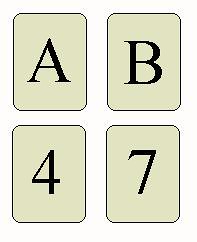My Defense of My Process
This is a little mind game from my psyc textbook. Each of these 4 cards has a letter on one side and a number on the other. Which two cards could you turn over to test the rule "If the card has a vowel on one side, it has an odd number on the other side?"

This illustrates the confirmation bias: the tendency to look for evidence that confirms our current beliefs. You can see that it applies even to points where we have no prejudices or vested interests, such as the four-card problem - how much more so in matters of ethics, politics and religion! But if we really want to know if our beliefs are right or wrong, we need to look for evidence that disproves them.
This is what I've been doing for the past couple years, even if I wasn't initially able to explain it. Some Christians tell me I'm too critical of Christianity. Well, I'm interested in knowing whether my beliefs about God and morality (which have potentially eternal implications) are true. Rather than simply appease my skepticism with reassuring apologetics, I look for possible flaws in my beliefs, and then try to determine whether the flaws are genuine. If I decide they are, I alter or replace my beliefs until they are no longer at odds with the available evidence. If I decide that a belief fits with the available evidence, I hold onto it until such a time as it comes back into question.
Some will complain that I'm biased one way or the other - either that I seem to be trying too hard to poke holes in my beliefs or that I ultimately cling to beliefs that don't fit with what I discover. I'm sure both complaints are valid in some instances. All I can say is that I'm just a man - prone to both error and sin, often falling victim to (and sometimes courting) various errors and logical fallacies. It might be a lie to say I'm doing my best, but I'm trying.
Some will say that I need to decide what I believe and then just have faith. I confess that I don't have a really firm grasp on what faith means or when it should be employed, but I can tell you that I'm not a great believer in "seeking an understanding within my faith". I understand this to mean taking what you believe for granted, and twisting everything else until it fits with your preconceptions. I have no interest in a faith that limits my ability to think honestly and objectively.
This is how I understand faith: I am not omniscient, therefore I frequently need to make decisions based on less than perfect knowledge. In these cases I try to make a decision that fits with the knowledge that I have, and let faith make up the difference. I have faith in many things, from the structural integrity of the chair on which I'm sitting to the trustworthiness of a friend to the existence of a benevolent God. My faith in my chair allows me to type much more comfortably than if I were standing, but if circumstances arose that cast doubt on my faith in my chair (say it makes cracking noises and begins to wobble) I wouldn't seek an understanding of these circumstances within my faith, I would get the hell off the chair! I'm sure most people would do the same. There is nothing noble about continuing to have faith in an untrustworthy chair. There's certainly nothing noble about pretending that there's nothing suspicious about creaks and wobbles. My father will not come by and explain to me that "We trust that chair", nor will anyone try to reassure me that "everyone has doubts about that chair from time to time". No one will suggest that I listen to a speaker give arguments for the strength of my chair or remember all the times when the chair has held me up. I think we can all agree that if the structural integrity of my chair comes into question I ought to examine it carefully and objectively. If I determine that the chair is in fact still strong, I will continue to sit on it. If not, I will look for a new chair.
If my chair falls apart while I'm sitting on it, I may hurt myself. If my religious beliefs turn out to be wrong, I there may be more serious consequences. I'm not saying your faith in your chair (or any of your religious beliefs) is misplaced. But doesn't it make sense to think critically about your beliefs? I guess I just don't understand why some people get antsy about questioning their faith, or even about me questioning mine. Do they really think God's going to object?
(Ok, I've just got to throw this in: a hilarious satire of the conservative paranoia with intellecualism can be found here.)


Post a Comment
1 comment:
That link was pretty funny. I think I'm going to have an intellectual orgasm.
Post a Comment